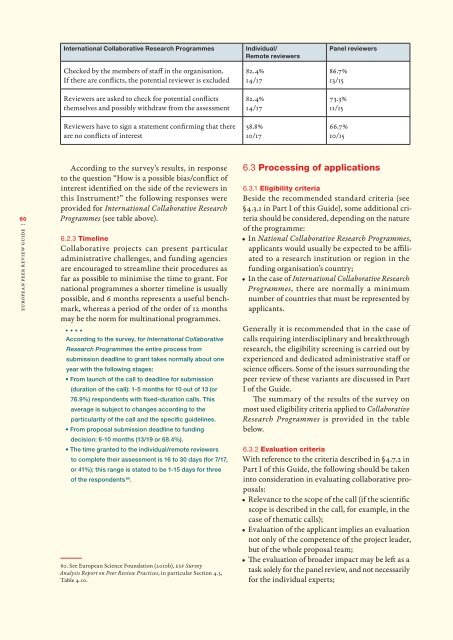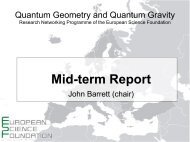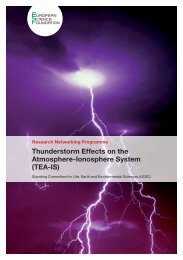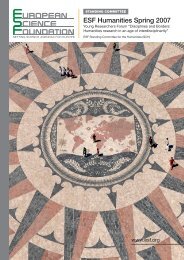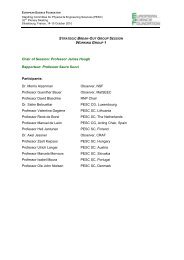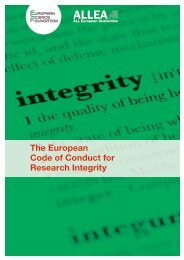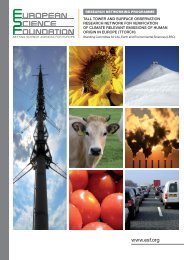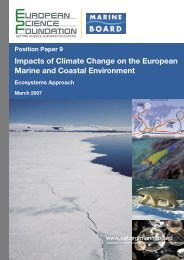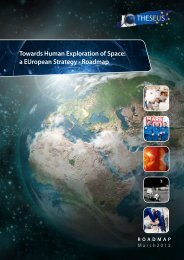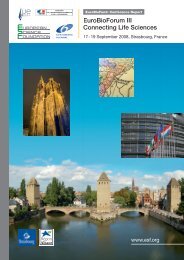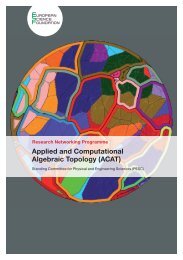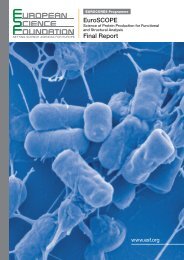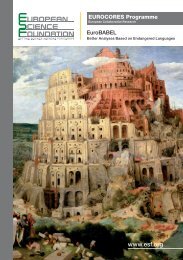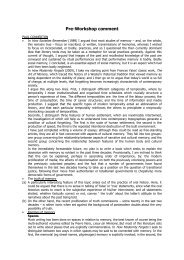European Peer Review Guide - European Science Foundation
European Peer Review Guide - European Science Foundation
European Peer Review Guide - European Science Foundation
You also want an ePaper? Increase the reach of your titles
YUMPU automatically turns print PDFs into web optimized ePapers that Google loves.
International Collaborative Research Programmes<br />
Checked by the members of staff in the organisation.<br />
If there are conflicts, the potential reviewer is excluded<br />
<strong>Review</strong>ers are asked to check for potential conflicts<br />
themselves and possibly withdraw from the assessment<br />
<strong>Review</strong>ers have to sign a statement confirming that there<br />
are no conflicts of interest<br />
Individual/<br />
Remote reviewers<br />
82.4%<br />
14/17<br />
82.4%<br />
14/17<br />
58.8%<br />
10/17<br />
Panel reviewers<br />
86.7%<br />
13/15<br />
73.3%<br />
11/15<br />
66.7%<br />
10/15<br />
60<br />
<strong>European</strong> <strong>Peer</strong> <strong>Review</strong> <strong>Guide</strong><br />
According to the survey’s results, in response<br />
to the question “How is a possible bias/conflict of<br />
interest identified on the side of the reviewers in<br />
this Instrument?” the following responses were<br />
provided for International Collaborative Research<br />
Programmes (see table above).<br />
6.2.3 Timeline<br />
Collaborative projects can present particular<br />
administrative challenges, and funding agencies<br />
are encouraged to streamline their procedures as<br />
far as possible to minimise the time to grant. For<br />
national programmes a shorter timeline is usually<br />
possible, and 6 months represents a useful benchmark,<br />
whereas a period of the order of 12 months<br />
may be the norm for multinational programmes.<br />
According to the survey, for International Collaborative<br />
Research Programmes the entire process from<br />
submission deadline to grant takes normally about one<br />
year with the following stages:<br />
• From launch of the call to deadline for submission<br />
(duration of the call): 1-5 months for 10 out of 13 (or<br />
76.9%) respondents with fixed-duration calls. This<br />
average is subject to changes according to the<br />
particularity of the call and the specific guidelines.<br />
• From proposal submission deadline to funding<br />
decision: 6-10 months (13/19 or 68.4%).<br />
• The time granted to the individual/remote reviewers<br />
to complete their assessment is 16 to 30 days (for 7/17,<br />
or 41%); this range is stated to be 1-15 days for three<br />
of the respondents 80 .<br />
80. See <strong>European</strong> <strong>Science</strong> <strong>Foundation</strong> (2010b), ESF Survey<br />
Analysis Report on <strong>Peer</strong> <strong>Review</strong> Practices, in particular Section 4.3,<br />
Table 4.10.<br />
6.3 Processing of applications<br />
6.3.1 Eligibility criteria<br />
Beside the recommended standard criteria (see<br />
§4.3.1 in Part I of this <strong>Guide</strong>), some additional criteria<br />
should be considered, depending on the nature<br />
of the programme:<br />
• In National Collaborative Research Programmes,<br />
applicants would usually be expected to be affiliated<br />
to a research institution or region in the<br />
funding organisation’s country;<br />
• In the case of International Collaborative Research<br />
Programmes, there are normally a minimum<br />
number of countries that must be represented by<br />
applicants.<br />
Generally it is recommended that in the case of<br />
calls requiring interdisciplinary and breakthrough<br />
research, the eligibility screening is carried out by<br />
experienced and dedicated administrative staff or<br />
science officers. Some of the issues surrounding the<br />
peer review of these variants are discussed in Part<br />
I of the <strong>Guide</strong>.<br />
The summary of the results of the survey on<br />
most used eligibility criteria applied to Collaborative<br />
Research Programmes is provided in the table<br />
below.<br />
6.3.2 Evaluation criteria<br />
With reference to the criteria described in §4.7.2 in<br />
Part I of this <strong>Guide</strong>, the following should be taken<br />
into consideration in evaluating collaborative proposals:<br />
• Relevance to the scope of the call (if the scientific<br />
scope is described in the call, for example, in the<br />
case of thematic calls);<br />
• Evaluation of the applicant implies an evaluation<br />
not only of the competence of the project leader,<br />
but of the whole proposal team;<br />
• The evaluation of broader impact may be left as a<br />
task solely for the panel review, and not necessarily<br />
for the individual experts;


